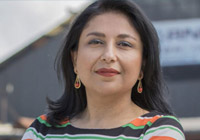I ALWAYS HAVE BEEN AN OPTIMIST.
With encouraging friends and a caring family, I have never felt the impulse to think that I could not overcome an obstacle and had to accept defeat. This was perhaps never truer than in seventh grade at Holy Angels grammar school, when our homeroom teacher began a weekly after-school program for students who wanted to do more with their writing than our textbooks required. She and our parents volunteered, at no cost, to run this program. I realized then that people were not necessarily limited by institutional constraints like school hours, and that I could put my dreams into action regardless of any perceived barriers.
My optimism became a habit of mind. Some- times I have been disappointed. But more often, I have been right to hope. So it is that I believe now, as I always have, that people will eventually over- come their differences and fears, both large and petty. I believe that we, meaning everyone, will at some point endeavor to find a way toward a greatness beyond what we currently think is possible.
Even so, I also believe that hope, however enduring, must be tempered by history. The 1930s, for example, were a time much like our own, tormented by economic dislocation, outbursts of prejudice and sociopolitical discord. Many in that era, including a large number of intellectuals, lost faith in democracy. They felt compelled to choose between left-wing and right-wing authoritarianism. The future, however, belonged to those who retained the belief that liberal, pluralist democracy was not simply the most decent way forward but also the most pragmatic. Democracy, as Winston Churchill said, was the worst form of government — except for all the others.
Today, many of us have fallen into believing our historical moment requires that we choose between an illiberal progressivism on the left and an aspirational fascism on the right, of the sort proposed by, say, Donald Trump or Hungary’s Viktor Orban. Against what many would say is all the evidence, I reject that as a false choice.
My own academic career seems to have been defined by decline. Dangerous regimes and a chilling rise in illiberal democracy around the world have been made more alarming by an American president who admires the same despots responsible for those assaults on democracy.
Watching in sorrow as crisis after crisis drench- es the daily news would be bad enough, if not for the fact that we humans are largely the cause of these miseries. To avoid seeming pretentious, I once refrained from this kind of commentary, but it has become impossible to ignore the fact that our willful collective selfishness and failures are responsible for so many afflictions in the world.
My empathy has grown a thick callus as I prioritize what to be the most upset about. Every time I hear something outrageous about the president, I just nod and continue with my day. A significant number of Americans apparently are no longer disgusted by family separations at the border, collusion with foreign powers, withholding military aid in exchange for political favors, race baiting, pointless lies about rally size, and a lifetime of inexcusable personal behavior that would have barred literally anyone else from the Oval Office. Beyond the White House, this administration’s ineptitude has made other crises, like climate change, refugees, institutional racism and, of course, COVID-19, far more frightening, because people know that any response is likely to be, perversely, the wrong response.
I am saddened — and a bit battered — by everything that is happening, but for all of its flaws and uncertainties, my generation is passionate, aware and motivated to seek social change. While we may not always pursue this change in the most effective or efficient ways, our passion for reform, when tempered by knowledge and experience, will lead to a better future.
The unassailable truth is that unless we safeguard our hope — the optimism I was fortunate to learn at home, in school and from experience — and nurture it into growth, then our present will skid into permanent disrepair. Our future will be grim. In a vicious circle, our pessimism will give birth to irrefutable reasons to abandon hope.
One day, I believe, we will achieve a society that provides equal treatment and opportunities to all, encourages everyone in their strengths and helps them overcome their weaknesses. We can achieve greatness by caring for each other, creating new ideas, inspiring art and liberating technology.
We will one day cure more diseases, including COVID-19. We will embrace the future and exceed the bounds of history.























